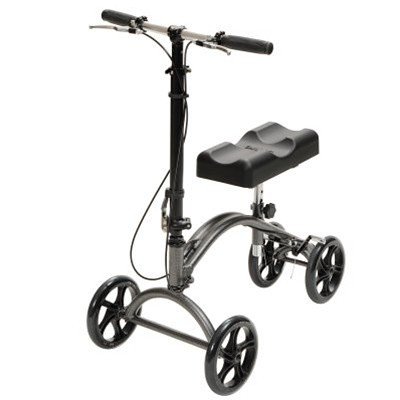A knee walker can be a game-changer if you’re facing mobility challenges due to a foot or ankle injury. These devices offer a comfortable and efficient way to move around while recovering. However, deciding whether to rent or buy a knee walker depends on several factors. In this guide, we’ll explore the key considerations to help you make an informed choice.
Understanding Knee Walkers
Before diving into the renting versus buying debate, let’s clarify what knee walkers are and how they work. A knee walker, also known as a scooter, is a wheeled device designed to support one leg while allowing users to propel themselves using their other leg. It offers a more ergonomic alternative to crutches, providing stability and reducing strain on the body during recovery.
Knee walkers typically feature:
- A cushioned knee pad for comfort and support.
- Handlebars for steering and balance.
- Swivel wheels for maneuverability.
These devices are suitable for individuals with lower leg injuries or surgeries, enabling them to maintain mobility and independence throughout their recovery period.
Renting a Knee Walker
Renting a knee walker is a popular option for those needing short-term assistance during recovery. Here are the main advantages and considerations:
Advantages of Renting
- Cost-Effective: Renting a knee walker is usually cheaper upfront compared to buying.
- Flexibility: Ideal for temporary injuries or post-surgery recovery periods.
- No Long-Term Commitment: You can return the knee walker once you no longer need it.
Considerations for Renting
- Total Cost: Although the initial rental fee may seem low, multiple weeks of rental could add up to the cost of buying.
- Availability: Depending on demand, knee walkers might not always be available for rent when you need one.
- Condition: Rental equipment may show signs of wear from previous users.
Read More: At-Home Opioid Treatment: Pros, Cons, and Best Practices
Practical Tips for Renting a Knee Walker
If you decide that renting is the best option for your situation, consider the following tips to ensure a smooth experience:
- Research Providers: Look for reputable medical supply stores or online platforms that offer knee walker rentals. Read reviews and inquire about their rental terms and conditions.
- Check Availability: Contact the rental provider in advance to confirm the availability of knee walkers for your desired rental period. During peak times, such as the summer months, demand for mobility aids may be higher.
- Understand Costs: Inquire about the total cost of renting, including any additional fees for delivery, insurance, or extended rental periods. Clarify the terms of the rental agreement to avoid surprises.
- Inspect the Device: When picking up the knee walker, inspect it thoroughly for any signs of damage or malfunction. Test the brakes and steering to ensure everything is in working order.
- Ask About Support: Understand the provider’s policy regarding maintenance and support during your rental period. Know whom to contact in case of issues with the device.
Buying a Knee Walker
Buying a knee walker offers its own set of advantages and considerations, especially for individuals with long-term mobility needs or recurrent injuries.
Advantages of Buying
- Long-Term Use: Buying can be more cost-effective if you anticipate needing mobility assistance beyond a few weeks.
- Personalization: You can choose a knee walker that best fits your needs and preferences.
- Convenience: Having your knee walker on hand eliminates the need to wait for rental availability.
Considerations for Buying
- Upfront Cost: Purchasing a knee walker requires a higher initial investment.
- Storage: You’ll need space to store the knee walker when not in use.
- Resale Value: Consider whether you might resell the knee walker after recovery.
Key Factors to Evaluate When Buying
If you lean towards purchasing a knee walker, consider these factors to make an informed choice:
- Quality: Invest in a high-quality knee walker that meets safety standards. Check for features like adjustable handlebars, comfortable knee pads, and sturdy construction.
- User-Friendly Design: Choose a knee walker that is easy to maneuver and adjust. This is especially important if you use it frequently throughout the day.
- Storage and Portability: Consider the size and weight of the knee walker, especially if you have limited storage space or plan to transport it frequently.
- Warranty and Support: Opt for a product that comes with a warranty and reliable customer support. This can provide peace of mind in case of defects or issues with the device.
- User Reviews: Research different models and read user reviews to gain insights into the durability and performance of various knee walkers.
Factors to Consider
When deciding whether to rent or buy a knee walker, consider the following factors:
- Duration of Use: Estimate how long you’ll need the knee walker. For short-term use (e.g., a few weeks), renting may be more practical. For extended recovery periods, buying could be more economical.
- Cost Comparison: Calculate the total cost of renting for your estimated duration versus the price of buying a new or used knee walker.
- Recovery Prognosis: Consult your healthcare provider for insights into your recovery timeline. This can help you determine the most suitable option.
- Availability: Check local medical supply stores or online platforms for rental availability and pricing.
- Comfort and Fit: If you have specific ergonomic requirements, buying a knee walker allows you to select a model that best suits your needs.
Making the Decision
Ultimately, deciding to rent or buy a knee walker depends on your circumstances. For short-term recovery needs or uncertain timelines, renting offers flexibility and affordability. Conversely, buying may be more cost-effective for prolonged use or recurrent injuries.
Before deciding, explore rental options in your area and compare them with the cost of purchasing a knee walker outright. Consider factors such as convenience, durability, and your recovery prognosis.
Conclusion
Knee walkers are invaluable aids for individuals recovering from foot or ankle injuries. Various factors, including duration of use, cost considerations, and recovery prognosis, influence whether to rent or buy a knee walker.
Evaluate your specific needs and circumstances to determine the most suitable option. Whether you opt for a short-term rental or a long-term investment, a knee walker can significantly enhance mobility and comfort during your recovery journey.
Apart from that, if you are interested to know about Recognizing the Role of Advanced Nursing Education in Enhancing Patient Outcomes then visit our Health category.























